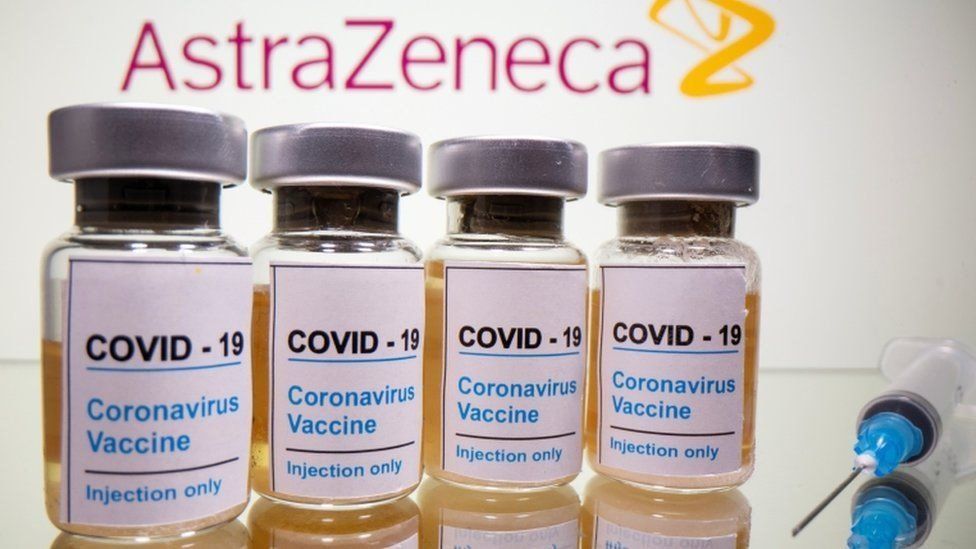
What is the Astra Zeneca vaccine?
The Oxford–AstraZeneca Covid 19 vaccine, codenamed AZD1222, and sold under the brand names Covid shield and Vaxzevria among others, is a working vaccine for Covid 19 developed by Oxford University. This viral vector vaccine contains a weakened version of a different virus (the vector). This teaches your body how to make a protein that will trigger an immune response.
Your body then makes antibodies that help fight the infection if the Covid 19 virus enters your body in the future.
A vaccine is a substance that should give you protection from Covid 19.
The Covid 19 vaccine ( Astra Zeneca) should give you immunity (protection) from Covid 19. If people are vaccinated, it should also reduce the numbers of people who become seriously ill or even die from Covid. Vaccines teach your immune system how to protect you from diseases. For an example Astra Zeneca vaccine protects you from Covid 19. It
is much safer for your immune system to learn how to protect you through vaccination than by getting Covid.
Getting a Covid 19 vaccine should reduce your risk of getting Covid 19 and protect you from serious complications of the illness. The goverments and HSE’s aim in offering the vaccine to the population (us) is to protect people and reduce the illness and deaths caused by this virus.
Can people still get Covid 19 with the vaccine?
The Astra Zeneca vaccine reduced the risk of people getting Covid 19 by 60% and the risk of people being hospitalised with Covid 19 by 100%. If you have a weakened immune system, there is no extra risk in taking the vaccine but it may not work as well for you.
What Happens when you get the Astra Zeneca Vaccine?
Like all medicines, vaccines can cause side effects. Most of these are mild tomoderate, short-term, and not everyone gets them.
More than one in 10 people may experience:
– feeling tired
– tenderness, bruising, pain, redness or itching in the arm where they had the vaccine injection
– headache
– muscle pain
– joint pain
– nausea or vomiting
– fever (temperature of 38 degrees Celsius or above)
More than one in 100 people may have redness or swelling where they had the injection. More than one in 1,000 may have reduced appetite, dizziness ,sleepiness, sweating, swollen lymph glands or a rash. Serious side effects, like a severe allergic reaction, are very rare, seen inapproximately 1 in 100,000 people.
My experience with Astra Zeneca
My expierence with Astra Zeneca is not from my peronal experience. But both of my parent’s. You see my parents got the vaccine because they’re jobs got classified as a healthcare front line worker. My Dad got the vaccine the 6th of April and my mom shortly after my dad the 8th of April. Once my dad got the vaccine he was feeling just fine until the night came. At around 6pm he started to have a headache but ignored it. Than from 2am to around 4am his muscles hurt, he had a high tempeture, headache and heart problems. He felt exhausted and tired. In the morning well at around 9am he felt just fine so for my dad he luckily only felt sick for a night.
It was way different with my mom though, once again straight after she got the vaccine she felt fine but then at around 7/8pm she started to get chills. At 10pm she got a very high tempetaure and it stayed like that until 6am in the morning. Aside that she had HUGE bone and muscle pain and when she took paracitamol but they only lasted from 30 minutes to 2 hours. And then the day after she got the vaccine which was Friday she got headaches but aside from that nothing else.
Astra Zeneca vaccine programme is paused in Ireland
The National Immunisation Advisory Committee has said that the benefits versus the risks of the AstraZeneca vaccine may vary by age and as alternative Covid-19 vaccines are available in Ireland, it has revised the recommendations for the use of the vaccine.
It said that the vaccine is not recommended for people aged under 60, including those with medical conditions with very high or high risk of severe coronavirus disease.
NIAC also recommended that a second dose of the Astrazeneca vaccine should not be given to anyone who “developed unusual blood clots with low platelets after the first dose”.
The latest advice also states:
– Those aged 60 and older should receive their second dose 12 weeks later as scheduled.
– People aged under 60 years with a very high risk or high-risk medical condition. Should receive their second dose 12 weeks later as scheduled.
– Adults aged under 60 years without a very high risk or high-risk medical condition. Should have the scheduled interval between doses extended to 16 weeks. To allow further assessment of the benefits and risks as more evidence becomes available.
Information from RTE News and The HSE.

